New Delhi, Sep 10: Prime Minister Narendra Modi on Thursday hit out at the Congress for not allowing parliament to function during the monsoon session, terming it 'hawalabaaz' (corrupt) and accusing it of creating roadblocks for the government.
 "Decisions were taken one after another in parliament. The 'hawalabaaz' were worried at the tough decisions by the government against black money. They could sense trouble ahead. That's why they are putting roadblocks on all major decisions," Modi said while addressing BJP workers in Bhopal before inaugurating the 10th Vishwa Hindi Sammelan.
"Decisions were taken one after another in parliament. The 'hawalabaaz' were worried at the tough decisions by the government against black money. They could sense trouble ahead. That's why they are putting roadblocks on all major decisions," Modi said while addressing BJP workers in Bhopal before inaugurating the 10th Vishwa Hindi Sammelan.
Modi's attack on the Congress came after its president, Sonia Gandhi, on Tuesday launched a frontal attack on Modi, terming his electoral promises as nothing more than "hawabaazi"(hot air).
"We had hoped that the Congress will work with us, help parliament in enforcing (fiscal) reforms but 'ek hai jo manta nahi' (there is one who does not agree). The Congress has not been able to digest defeat (in Lok Sabha elections)," Modi said.
Assuring the people of India about fulfilling their dreams, the prime minister appealed "to those defeated and rejected by the people to please let the nation move ahead".
"Every political party must leave no stone unturned to meet public expectations if it won and also introspect in case of defeat," he added.
"We faced defeat in 1984. We introspected and tried to learn from that defeat. But we didn't criticise others and corrected our mistakes instead. Today, the nation has given us a majority (in Lok Sabha)."
"There was a time when the BJP had only two MPs in parliament. The then prime minister Rajiv Gandhi made fun of BJP in parliament and we had to listen to it," Modi recalled.
"There was a time when the Congress had more than 400 seats in parliament, but now had been reduced to 40-odd seats," he added.





Comments
Add new comment